We’re still here: Keeping Carolina healthy
When most Carolina faculty and staff went remote last spring, many employees at the University Employee Occupational Health Clinic and Campus Health strapped on masks and came to campus to provide health care to Carolina employees and students. A year later, they’re still at it.
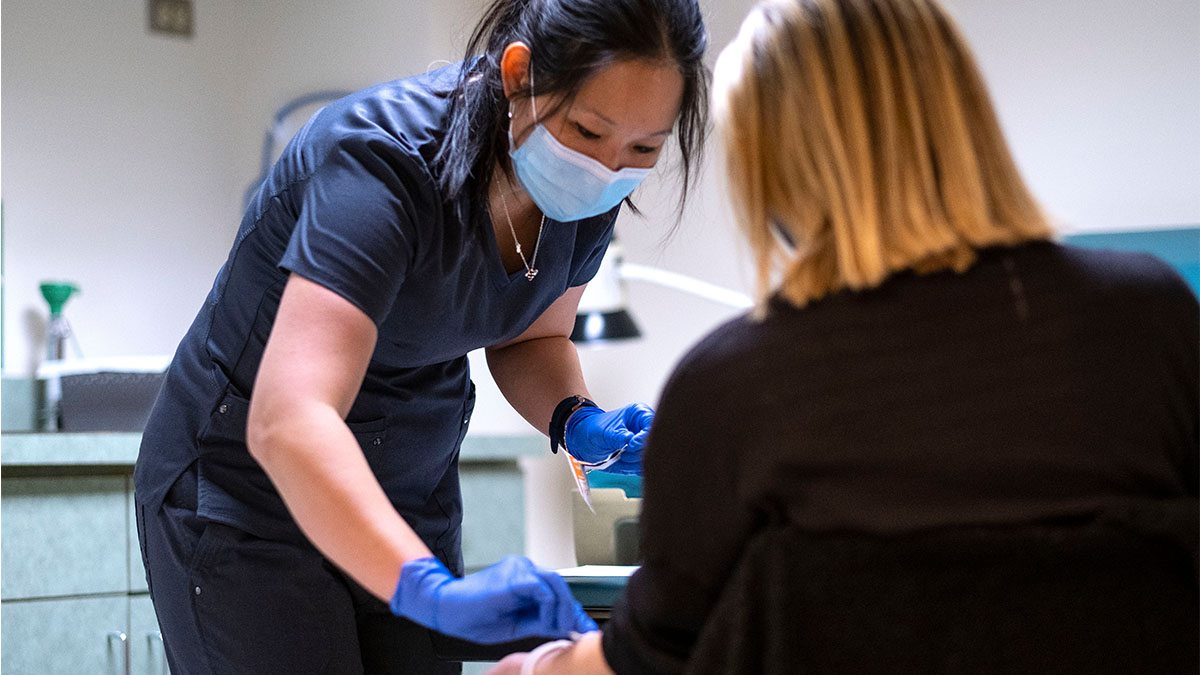
In March of last year, when the University transitioned to remote learning, many employees left campus to work from home. Most haven’t returned to campus. Other employees never left. They need to be on campus to do their jobs, and so they strap on a mask and come to work. That’s the case at the University Employee Occupational Health Clinic and Campus Health, where staff show up every day to keep the campus community healthy.
Tucked between the School of Nursing and the Genome Science Building, the University Employee Occupational Health Clinic provides care to all University employees, including treatment and assessment for workplace injuries/illnesses, pre-employment health screenings, annual immunization reviews for those working in healthcare settings and medical surveillance screenings for employees who work under hazardous conditions.
Last March, as campus emptied and fear surrounding COVID-19 grew, Ashley Suits, an administrative support and workers’ compensation associate, and Jenna Pauli, an occupational health nurse, said a temporary goodbye to co-workers who went remote and kept the lights on at the clinic when many buildings were going dark.
Keeping the lights on
Pre-pandemic work at the clinic was predictable: all eight employees worked in-person Monday through Friday with typical cases of worker’s compensation injuries, reviewing immunization records and occupational surveillance physicals. Employees could visit the clinic by scheduling themselves online for appointments or simply walking into the clinic.
During the first two months of the pandemic, the clinic was empty apart from Suits and Pauli. Wearing masks, face shields and gloves and with plenty of hand sanitizer at the ready, they saw patients whose in-person visits were necessary, answered phone calls from patients and took advantage of the empty clinic to complete a project they never would have accomplished before: electronically archiving charts of inactive employees. They covered their remote coworkers’ spaces and common areas in the clinic with charts and started scanning, which would have been impossible when they were at full capacity.
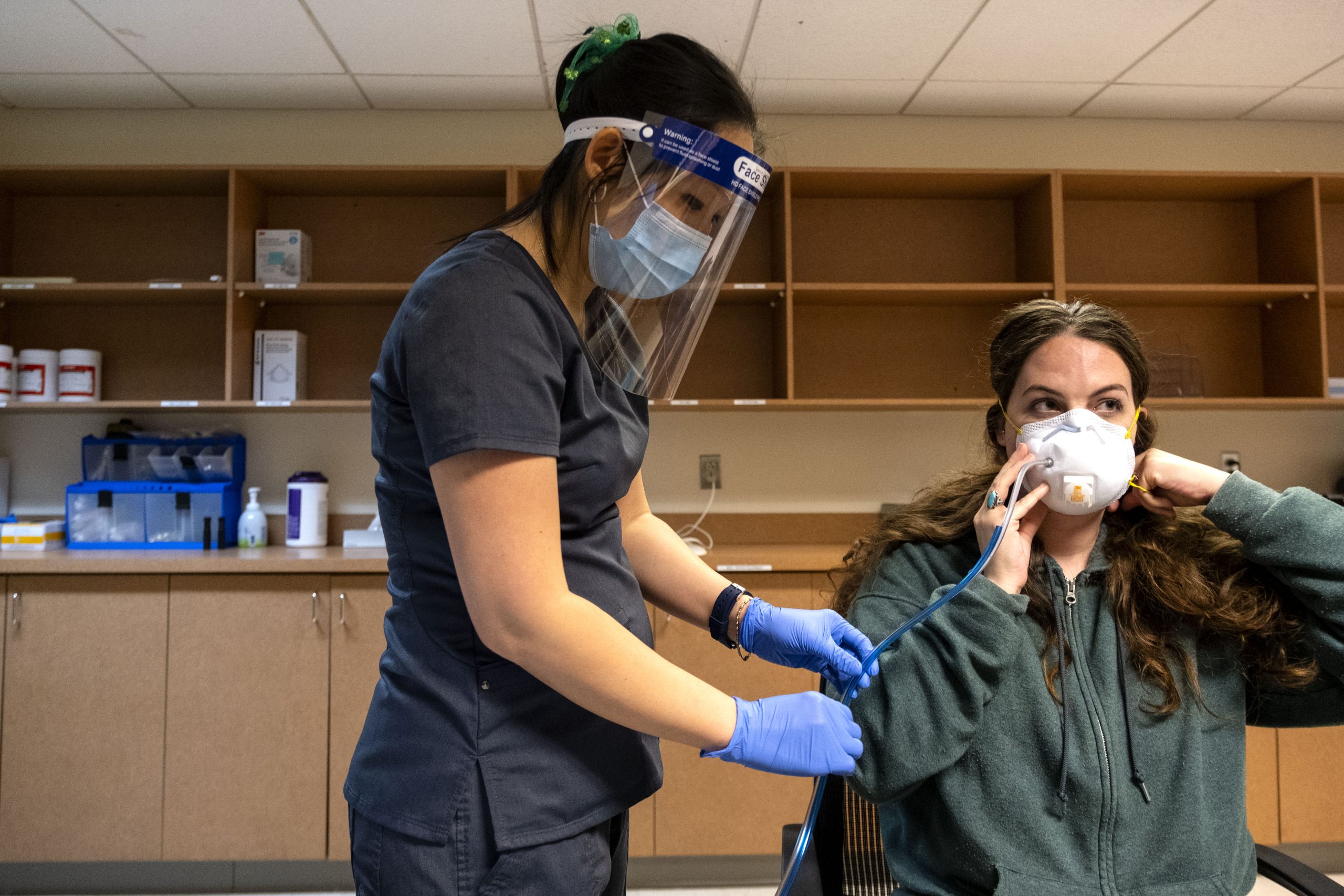
In full PPE, occupational health nurse Jeanne Brueggemann performs a routine mask fit test on Chelsi Holle. This was a common test at the clinic before mask-wearing became the new normal. (Jon Gardiner/UNC-Chapel Hill)
Suits and Pauli both said they observed an eerie quiet on campus that neither had ever experienced before. Even during University breaks there are still other employees moving around campus or walking into the clinic, but never absolute calm. One silver lining, they said, were the empty campus roads and parking lots that made their commute easier than it ever had been.
“It gave me a sense of pride to be able to continue working on campus to help support other employees,” says Suits. “I wasn’t worried about reporting to campus during the pandemic because we followed all appropriate procedures to protect ourselves, and any employees that did come into the clinic were required to wear appropriate PPE and maintain physical distancing.”
After two months, Suits and Pauli’s six coworkers returned to work in person at the clinic, where they faced a new challenge: fielding thousands of phone calls from University employees with questions about COVID-19.
Adapting to unprecedented times
During the past year, the clinic staff has used around 500 masks and 25 one-gallon bottles of hand sanitizer, and they have fielded almost 6,000 phone calls about COVID-19.
The clinic does not test employees for COVID-19 or carry the vaccine. But, when employees call with COVID-19–related questions, the clinic employees go above and beyond to answer them. Some of these calls include scheduling employees at the Respiratory Diagnostic Center for testing, placing employees on COVID-19–related absences, answering questions about the vaccine or symptoms and helping identify people who have been in close contact with COVID-19–positive employees. To make sure they can answer all the calls about COVID-19, the staff created a rotating schedule that includes weekends and University holidays, so someone is always manning the phones.
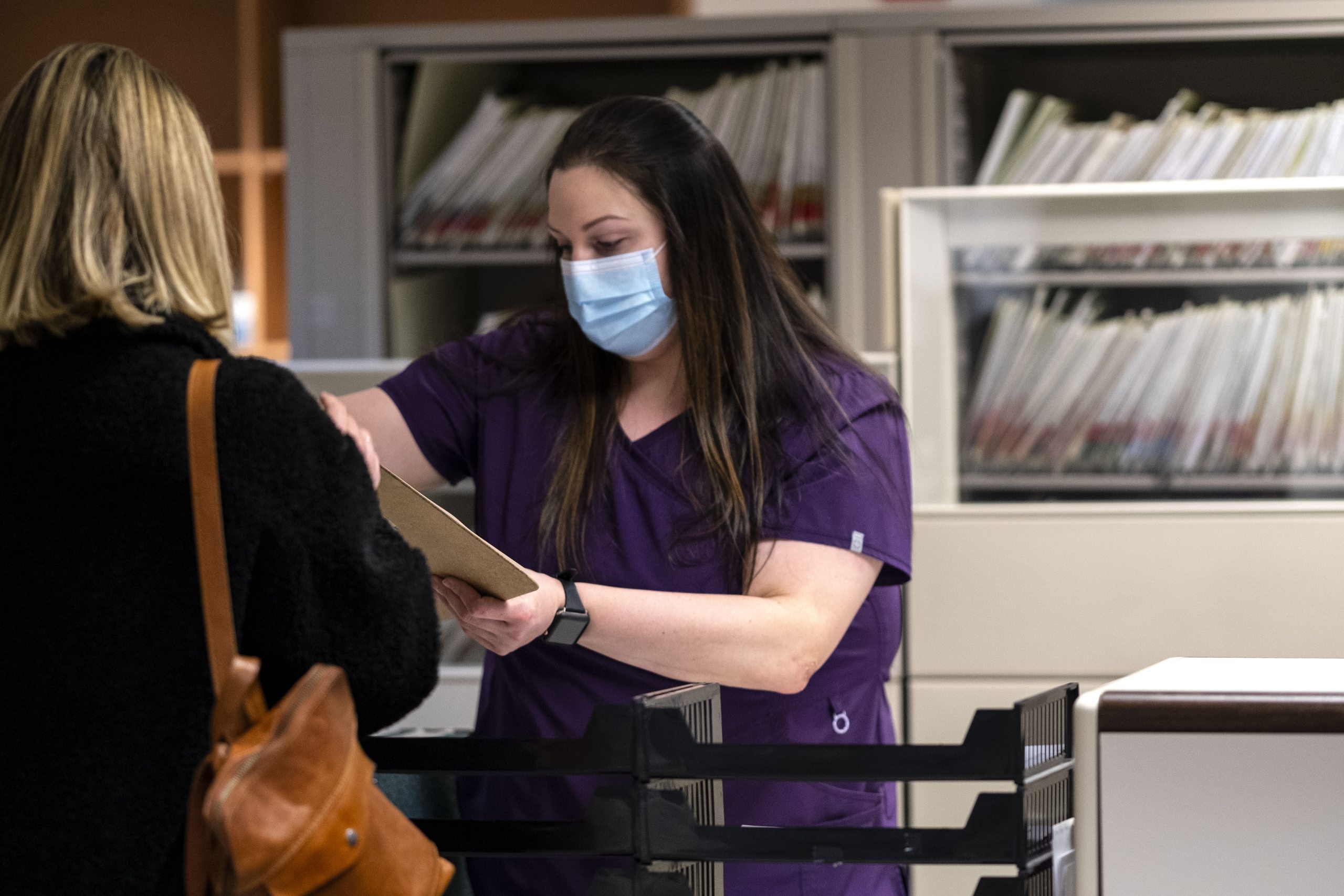
Administrative support associate Ashley Suits helps an employee check in for a pre-scheduled appointment at the clinic. (Jon Gardiner/UNC-Chapel Hill)
Pauli encourages employees with any questions about COVID-19–related symptoms, exposures and testing to reach out to the clinic. Even if they don’t know immediately, she said, they’re willing to do the research to find the answer.
The clinic employees also adjusted the patient-appointment process to keep themselves and the visitors safe.
To reduce the time spent in the clinic, employees must schedule an appointment over the phone and submit any necessary paperwork online. This allows the staff to review the documents and, in some instances, eliminate the need for an appointment altogether. All visitors to the clinic are required to wear a face covering to enter, and the staff use PPE as well.
Suits said she felt perfectly comfortable reopening the clinic full-time to employees again due to their PPE supplies and safety measures, and they’re all glad to have the team together again.
Keeping Carolina (students) healthy
During the pandemic, UNC Campus Health has stayed open to keep providing its essential services — primary care, ambulatory medical care, mental health services and wellness programs — to students who remained on campus and telehealth visits for students who went remote.
“As a health care provider, we’re actually one of the safer places you can be because we know all the infection control work and we’re all in protective equipment,” says Executive Director of Campus Health Ken Pittman.
Campus Health is a big and vital operation. In a typical year, it books 100,000 appointments, and its pharmacy fills 60,000 prescriptions. This past year has been far from typical. Among Campus Health’s 150 staff members, 100 have worked at least partially on-site during the pandemic.
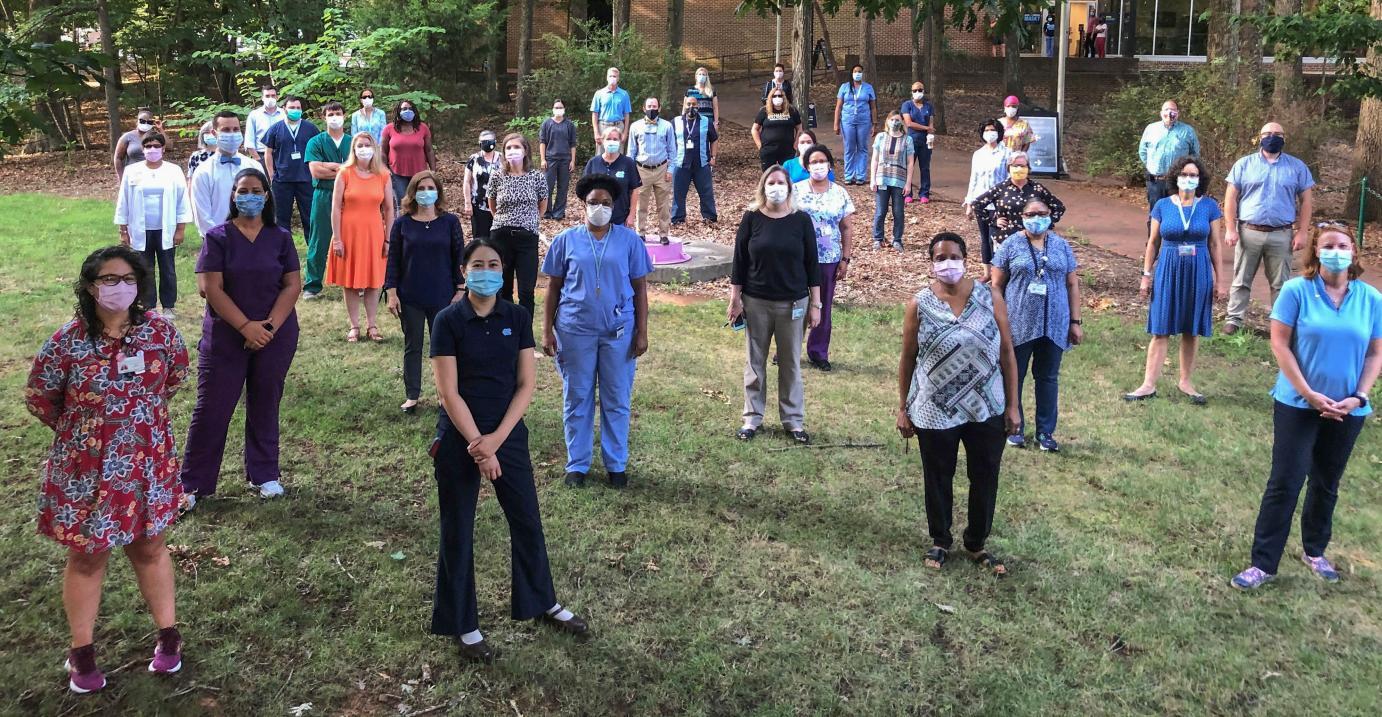
Campus Health employees in PPE gathered outside the James A. Taylor Building, home of Campus Health. (Image courtesy of Campus Health)
“We have curbside pickup we’ve developed for students during COVID where they’re able to drive up and our pharmacy technicians actually take their products and prescriptions to them in their vehicles,” says Pittman.
Campus Health is also in the process of setting up a vaccination clinic on campus for students.
Since the start of spring semester, Campus Health has conducted nearly 2,000 close contact traces.
“We believe the work we’re doing to contact those students — to care for them, certainly — but to contact them and move them into isolation and quarantine protocols, whether they be on campus or off campus, has really contributed thus far — knock on wood — to an extraordinarily successful semester in terms of our positivity rate among out students,” says Pittman.
Looking ahead
One clinic employee is looking forward to the end of the pandemic just to understand what “normal” means at work. Victoria Creech, a physician assistant who began working at the clinic in August of 2020, has only known the clinic in its current pandemic-limited state and missed the opportunity to get to know her new co-workers socially.
“It was difficult to match names to faces of associates as no social operations were permitted due to COVID-19 restrictions,” says Creech. “Weekly zoom meetings helped, but I think we all are looking forward to the safe return of community activities.”
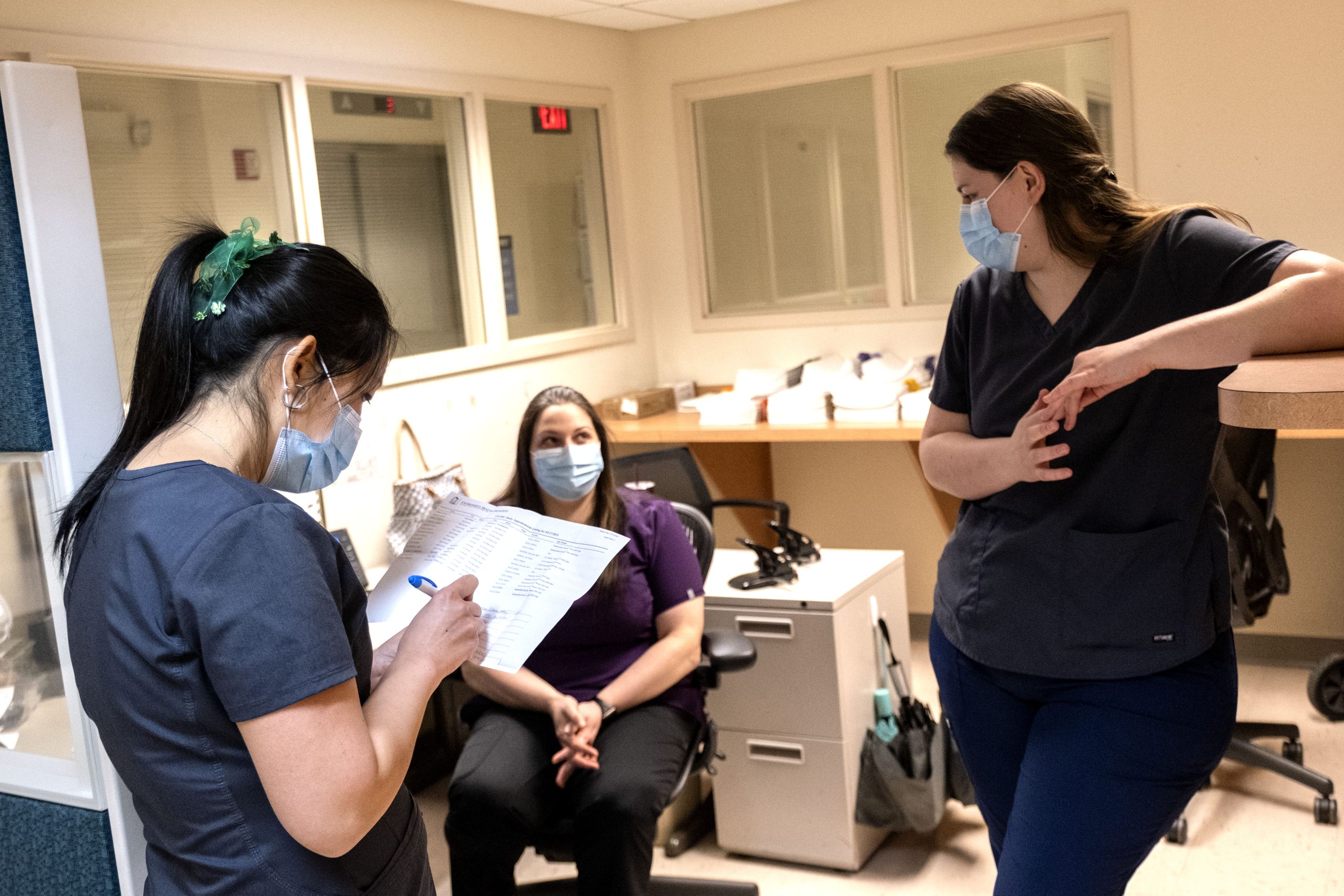
Occupational health nurses Jeanne Brueggemann (left) and Jenna Pauli (right) talk with administrative support associate Ashley Suits in the clinic’s intake area. Suits and Pauli remained in-person at the clinic throughout the pandemic. Their six co-workers rejoined them on site in May. (Jon Gardiner/UNC-Chapel Hill)
Staying open during the pandemic has proved to be one of the biggest challenges the clinic has ever faced, and despite the temporary physical separation, it brought the clinic staff together through creative problem-solving.
“The pandemic really challenged our team to remain flexible, and at times it has been difficult to sort out the best solution,” says Suits. “Ultimately, the ability of our team to adapt to constant change in an unprecedented time has helped us become closer and more cohesive.”
Not only did the clinic staff keep their lights on for University employees for the last year, but they provided something rare during the pandemic: reliability.
“Our clinic has provided a stable presence during this trying time,” says Suits. “We’ve done our best to remain up to date on all COVID-19–related topics to help guide employees, and, hopefully, help ease some of their worries.”




